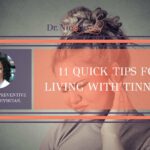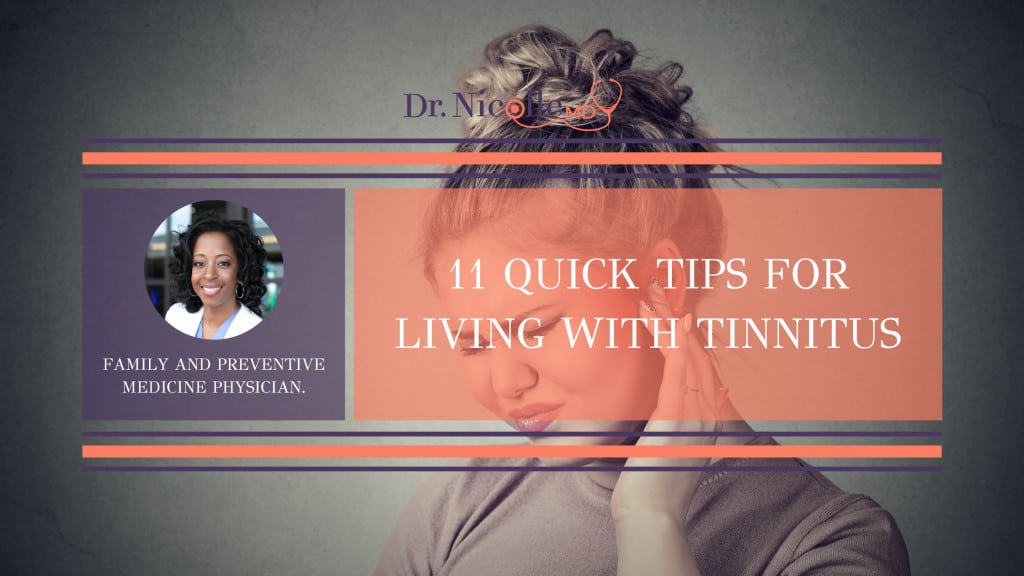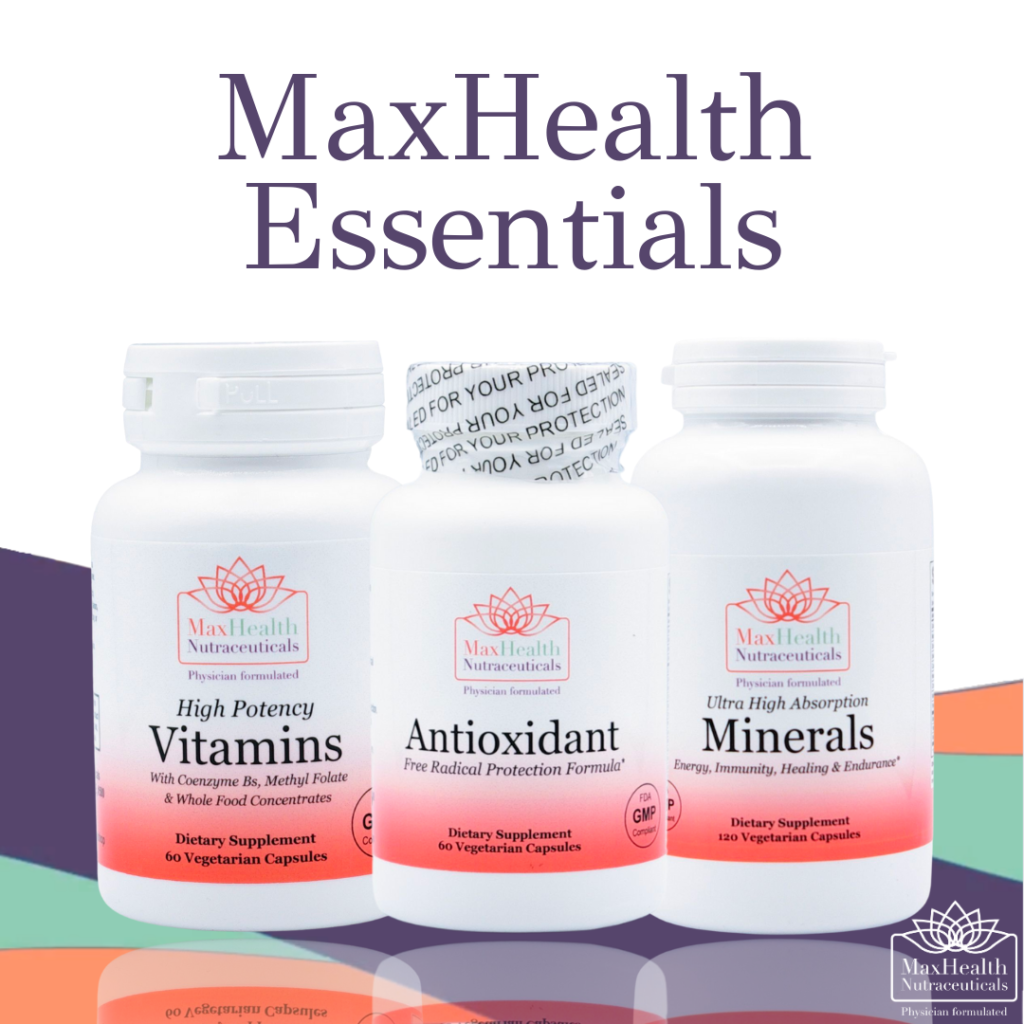

It’s Wellness Wednesdays! We’ll talk about some tips for living with tinnitus. Tinnitus refers to a ringing in the ears that often accompanies hearing loss. An estimated 50 to 60 million people in the US experience these symptoms, especially as they grow older. While tinnitus rarely indicates a serious condition, it can be challenging to live with.
Most forms of tinnitus are caused by your nerves reacting to abnormal electrical signals that your ears are sending to your brain. While it’s usually called ringing in the ears, it can be any kind of sound, including whistling, buzzing, or roaring.
If you think you have tinnitus, it’s important to see your doctor to determine what type of tinnitus you have and what your options are.
Meanwhile, take a look at these tips for eliminating the symptoms or minimizing their impact on your life.
Treating Tinnitus That Has a Known Cause
Tinnitus can have many causes. Your doctor will perform tests and ask about your medical history to determine what’s appropriate for your symptoms.
These tips may help:
1. Wait it out.
Tinnitus that follows exposure to a loud noise is usually temporary. To prevent future damage, avoid loud noises or wear protective gear.
2. Check your medication.
A number of common drugs can trigger tinnitus. That includes aspirin and other nonsteroidal anti-inflammatory drugs, and some antibiotics and cancer drugs. Talk with your doctor about changing your prescription.
3. Remove ear wax.
Impacted ear wax can also be a factor. To be safe, let your doctor remove it rather than trying to do it yourself.
4. Treat related conditions.
In rare cases, tinnitus may be a sign of underlying issues, including vascular conditions or tumors. Proper treatment can help restore your health.
5. Recognize pulsatile tinnitus.
Unlike other forms of tinnitus, this one produces sounds that your doctor can hear too, because it’s caused by the blood circulating in your body. Your doctor can treat any related conditions, and may recommend medication and lifestyle changes.
Treating Tinnitus When the Cause is Unknown
In some cases, tinnitus has no clear cause or appears to be related to aging. You may still find significant relief through various treatments and coping methods.
These actions may alleviate the noise:
1. Mask the sound.
Special equipment or an ordinary fan can provide background noise to make the sounds in your ears less perceptible. You might want to test an inexpensive method first before investing in more expensive devices.
2. Wear a hearing aid.
Hearing aids can reduce your tinnitus and enhance your hearing. A trained audiologist can help you select a tinnitus masker or any kind of model that you may need.
3. Relax your muscles.
Muscle tension can aggravate tinnitus. Tell your doctor if you clench your jaw or grind your teeth. They may recommend massage therapy.
4. Practice self-care.
Tinnitus can interfere with your sleep and make it more difficult to deal with discomfort. Make an extra effort to eat well, exercise, and get adequate rest. You may also want to avoid potential irritants such as tobacco, alcohol, and excessive caffeine.
5. Try therapy.
Cognitive behavioral therapy and tinnitus retraining therapy have both shown promising results. CBT generally lasts a few months, and can help you learn coping skills. TRT involves wearing a special device for a year or more to help your auditory system become less aroused by the noises.
6. Consider medication.
There is no drug specifically for tinnitus. However, your doctor may recommend antidepressants or anti-anxiety drugs, depending on your individual symptoms.
There are many effective treatments for tinnitus and hearing loss. Talk with your doctor about your options, consider wearing a hearing aid, and try other remedies that can reduce the ringing sounds and help you to hear well.
I would love to give you a free resource sheet to support your overall wellness. Click the button below to receive your gift.
I really wanted to talk about this topic today because your natural health and wellness is important. You can adopt healthy lifestyle practices that improve your health, your environment, and enrich your life, which can in turn improve the lives of those close to you. You have the power to break the cycle of poor health, including chronic disease, so that you can leave a legacy of health to your loved ones.
I use functional medicine and lifestyle medicine as the first line of treatment, before medications, to treat lifestyle-related chronic diseases. Lifestyle-related chronic diseases include diabetes, hypertension, obesity, and some cancers, just to name a few. Lifestyle practices, such as eating a whole-food plant-based diet and regular physical activity, can help you lose weight, reverse some chronic diseases (if you suffer from them), and can even help you with detoxification. In certain cases, these approaches may even outperform pharmaceutical therapy.
But I always tell my patients that conventional medications may be appropriate at this time to prevent catastrophic illness, but over time, you can work to make the necessary lifestyle changes to possibly reduce and/or eliminate medications. Please remember to always consult your physician for your particular needs and circumstances prior to making any decisions whatsoever.
Is Dietary Supplementation Right For You?
For some people, vitamin and mineral supplements offer important health benefits. Supplements are designed to fight deficiencies found in our diet and complement the food we eat regularly. Supplements are basically “helping hands” to our daily food.
If you suspect that you aren’t getting the nutrients you need, consider shifting your focus from supplements to eating better.
But it is very important to note that we are not eating the same foods we ate years ago because the soils have been depleted of critical nutrients through current industrial farming practices. And because the soil is not as good as it used to be, the food supply (grown from the depleted soil) is not as good as it used to be. For example, you are not getting the same levels of magnesium as you would have gotten 30 or even 50 years ago.
Second, much of the food has been genetically altered, which can impact the inherent and unique nutritional composition that each food possess. For example, ancient einkorn wheat has less gluten, more protein, more Vitamin A, and more beta carotene, than modern genetically modified wheat.
Third, the toxic load in the environment today is much higher than 100 years ago. We can see this with global warming, toxic landfills, polluted oceans and waterways, etc. Toxicity levels interfere with nutrient assimilation and absorption not just into the foods, but into our bodies as well.
So… if you are unable to eat better, the supplements in my MaxHealth Essentials Bundle may provide the extra boost you need.
These are my favorite Wellness and Immune-Boosting Supplements to use! This MaxHealth Essentials Bundle will ensure you have the intake of the important vitamins, minerals, and antioxidants to decrease inflammation and boost your innate wellness day and night. Taken together, it’s a solid plan for increasing your body’s natural resiliency.
For best results make sure you use the supplements with dietary changes including a whole food plant-based diet, regular exercise (at least 2-3x per week), regular sleep (8 hours per night), and intermittent fasting (at least 1-3x per week).
Weight Monitoring
Since weight management is very important in combatting chronic diseases, I recommend that you be mindful of your weight and its fluctuations, and that you monitor your weight AT LEAST on a weekly basis. I recommend a scale that includes a body composition monitor (*this scale cannot be used with a pacemaker or other implanted devices).
Physical Activity
Physical activity (or exercise) can improve your health and reduce the risk of developing several chronic diseases like high blood pressure, type 2 diabetes, and cancer, just to name a few. Physical activity can improve your mood, boost your immune system, help you maintain a healthy weight, and is a great way to detox your body!
I often recommend yoga and resistance training for physical activity, but as you are aware, there are plenty of forms of “movement” that you can do! But for the basics, especially if you’re just getting started, yoga and resistance training are where I would start.
Yoga
Yoga can be a great way to improve your strength and flexibility, manage your stress, improve your heart health, and lose weight! I recommend using a grounded yoga mat to connect yourself with the earth and reduce inflammation.
Resistance Training
Resistance training is the mainstay for overall health. It not only has beneficial effects on reducing body fat, it also increases muscle size and strength. Check out some basic dumbbells/free weights that I recommend to everyone.
Another alternative for dumbbells/free weights are resistance bands. They are great for physical therapy, yoga, strength training, and excellent for traveling.
Remember, living a healthy lifestyle including eating a whole foods plant-based diet, regular physical activity, and reducing stress are the best ways to maintain a healthy weight. Let me know what you think in the comment section below.
Dr. Nicolle Martin
Some of the links in this article are "affiliate links", a link with a special tracking code. This means if you click on an affiliate link and purchase the item, we will receive an affiliate commission.
The price of the item is the same whether it is an affiliate link or not. Regardless, we only recommend products or services we believe will add value to our readers.
By using the affiliate links, you are helping support our Website, and we genuinely appreciate your support.
Last updated on August 1st, 2023 at 10:02 pm

Minimize Medications. Maximize Health.
Are you super busy but need to take control of your health? Are you tired of being tired? Subscribe to my “Minimize Medications, Maximize Health Blog” and I’ll give you 7 Tips to Get Healthy in No Time absolutely FREE.






